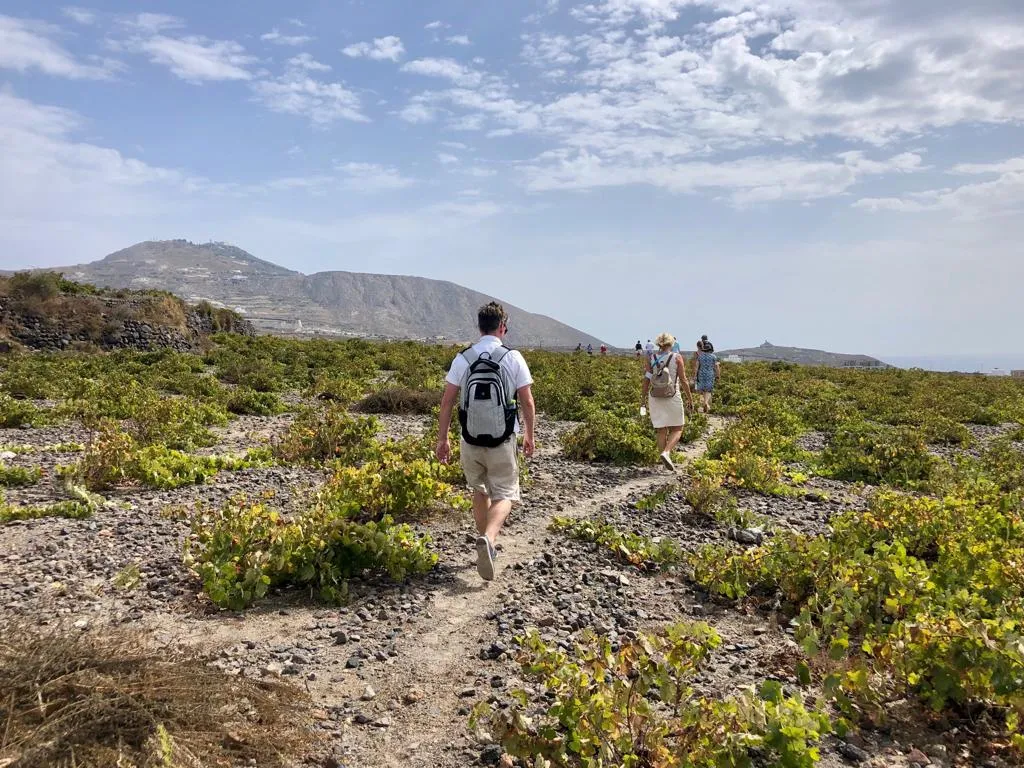
Santorini on its way to UNESCO
Last year a very interesting development took place; Santorini was included in the National Index of Intangible Cultural Heritage and was the first PDO region in Greece that succeeded in doing so. This piece of news is extremely important as it paves the way for Santorini to also be included in the UNESCO list of World Heritage. In the article that follows, by Nikos Varvarigos, Ioanna Vamvakouri and Krystalia Papaikonomou, the effort made to achieve this is described in detail.
The wine-growing tradition of Santorini as part of the Intangible Cultural Heritage of Greece
Santorini is the first Protected Designation of Origin (PDO) wine region to be included in the National Index of Intangible Cultural Heritage (APK). The distinct vineyard cultivation methods, together with the wine traditions of Thera-Therassia, were encompassed into the National Index at the beginning of 2018, and now form part of the recorded Intangible Cultural Heritage of Greece.
The awareness of the necessity to safeguard and preserve the particular wine heritage of this place gave rise to the initiative. Several wine-growing regions of Europe have managed to join the UNESCO list, and have thus ensured the viability of their vineyards and have highlighted the uniqueness of their area.
The documents that had to be submitted were gathered very soon after the International Symposium that was organized on the island Santorini in 2015, by the UNESCO Department of "Culture and Traditions of Wine" of the University of Burgundy, which focused on "Heritage and Development of Wine-Growing Regions". The group in charge of this project consisted of oenologists, Mr. Nikos Varvarigos and Mrs. Ioanna Vamvakouri together with communications specialist Mrs. Kristallia Papaeconomou, and it was supported by the municipal authority of Thera, the wine industry and the National Inter-Professional Organization of Vine and Wine. It took almost 2 years to complete the project.
In February 2017 the factual application, accompanied by extensive audiovisual material and bibliography, was submitted to the Ministry of Culture and Sports, General Directorate of Antiquities and Cultural Heritage, Directorate of Modern Cultural Heritage. Approved by the National Scientific Committee Implementing the Convention for the Safeguarding of the Intangible Cultural Heritage in February 2018. The candidacy of Santorini was considered to be one of the most notable, as it was very thorough and well documented. The next step is to have it included in the UNESCO list. The necessary procedures were followed immediately, from the following day.

The National Directory depicts elements of the Intangible Cultural Heritage of Greece in the form of a directory and is the valid and updated picture of the intangible cultural heritage of our country. The included ICH Report on Santorini contains all the items that comprise the intangible cultural heritage of the island, which need to be safeguarded and showcased. Indicatively, the main items are as follows:
More at the Link: http://ayla.culture.gr/i_ampelooiniki_klironomia_tis_santorinis/
The historical vineyard of Santorini enhances the natural and cultural scenery of the island. This vineyard is one of the few in the world that is ungrafted and untouched by phylloxera, and has a historical presence of 3,500 years in the unique terroir of the island. Over the centuries, the vine-growers of Santorini have adopted special cultivation techniques (Kouloura or Ambelia) for the production of the island's PDO wines (Santorini, Nyhteri, Vinsanto). At the same time, the special tools used during the grape harvest (e.g. Ferentini, Kofinia), as well as the peculiar architecture of the wineries (Kanava, Patitiri, kofinia) are part of this tradition.
Folklore pertaining to the harvest and wine is rich in Santorini and includes wine celebrations for the harvest, and traditions that mark the beginning of the new Harvest (Agios Averkios), accompanied by songs and particular dishes made during this time (manestra of Vendema, tomato patties, and others); these are still practiced today.
Special referral needs to be made to the linguistic tradition of wine – the wine vocabulary of Santorini, as it has been developed over time.
Intangible Cultural Heritage is a reality that has life, which changes, evolves, transforms, adapts, is enriched, and is transferred to future generations by monitoring the social, cultural and economic transformations.
The fact that the wine tradition of Santorini was included in the National Index is a beginning for the wine industry to act collectively for its inclusion in the list of Intangible Cultural Heritage of UNESCO. The special wine-growing techniques and practices of Santorini are an intangible cultural heritage not only of the island but of Greece as a whole. Everyone's efforts should be focused on highlighting and promoting this request, as this will ensure that these unique cultural elements are preserved. Let Santorini open the way for the inclusion of all the special wine traditions/zones of our country on the list of UNESCO.
Article editors: Nikos Varvarigos, Ioanna Vamvakouri, Krystallia Papaeconomou.
Santorini 11-10-2019
Copyright - Yiannis Karakasis MW 2025
